Indie Game Club Issue 3: How Fish Is Made
What does it all mean?

It's here! This is the third meeting of the SUPERJUMP Indie Game Club, where we invite YOU to play along with our contributors! This month we played the grotesque and thought-provoking How Fish is Made by Wrong Organ. If you want to catch up, you can play this game for FREE on Steam.
As always, our mission is to highlight independent developers that don't ask for a single cent in return. Next month won't be any different as we explore 2020 Epic Mega Jam submission No More Papers Please by Panchinerino, Urbancat, NotFrancis, and Flammyth. You can play along by downloading the game for free on itch.io and coming back next month to SUPERJUMP.
Following are the accounts of our fish this month, enjoy!
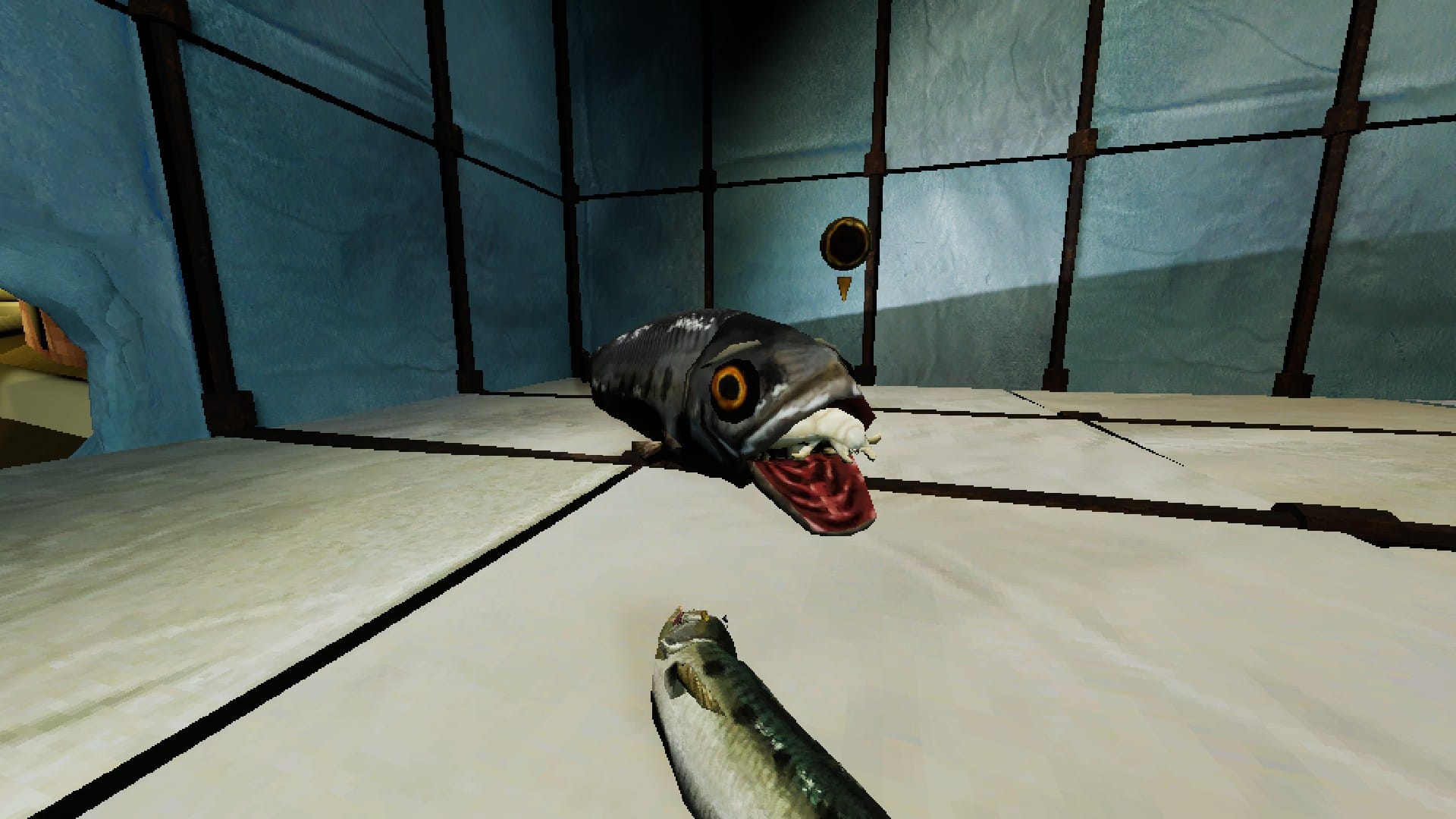
Nathan Kelly
“All thoughts wail simultaneously, the merged knowledge of insignificant brains.”
I approached How Fish Is Made expecting a horror commentary about the gruesome realities of fish farming. I received exactly this in the realization of your average flesh walls (thank you Silent Hill) and musical numbers (thank you Alan Wake). This short horror experience is more an abstract thought-piece than a mechanical game, so let’s discuss interpretation, specifically mine.
The viewpoint of the fish is realized expertly in cryptic dialogues that remind you “not to talk to the machine, it can’t hear you” and offer you the grand illusion of “UP or DOWN” (or was it LEFT or RIGHT?).
The game's visuals keep you on edge as featureless rooms reveal themselves. This religious pilgrimage the fish must make keeps the conviction that at least one part of its life is under its control. A journey while deciding if metal corridors confine it or if a beast has actually swallowed it. Graphic imagery makes the player uncertain as the belly of the beast nears until the most chilling reality is revealed: “did it matter?”
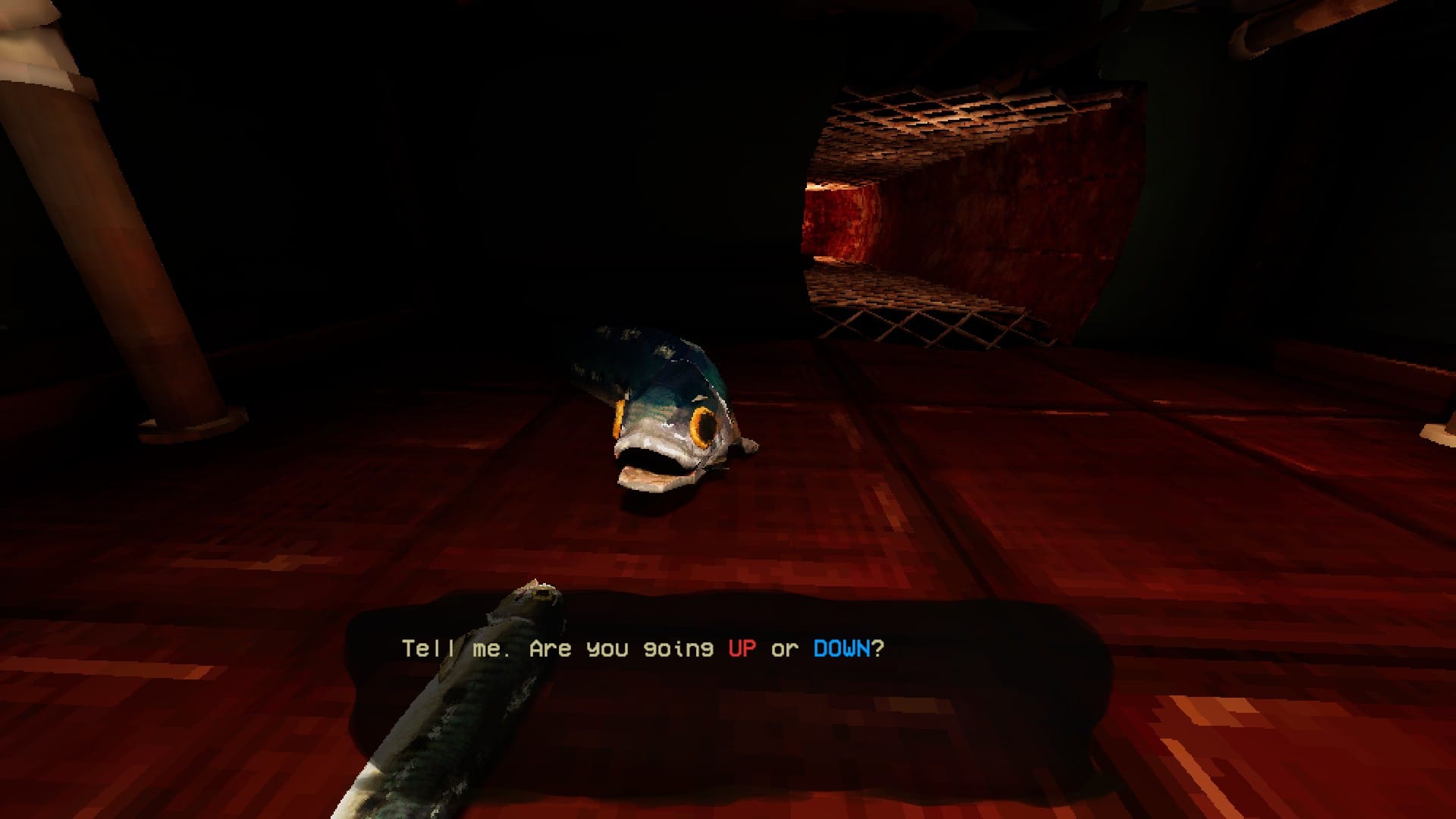
A smart talking fish asks you about your trek through the machine. Did you decide? Were you filled with conviction? Were you honest about your choice when speaking to others?
These questions are rhetorical because, like the rest of the decisions, it is ultimately inconsequential; your fate is the same whether you go up or down in the end. You don’t need to replay and see both endings to come to that conclusion. I can’t pretend to know the exact intent of the piece, but How Fish Is Made left a deeply abstract impression on me, seeming to say that our individual decisions and convictions make us more human than the outcome of those decisions. How Fish Is Made also says that the collection of these human experiences becomes cosmic noise in the collective subconscious. Nothing can be accomplished because no consensus can be reached.
“As one, you are a swelling god of no purpose, no direction, no self.”
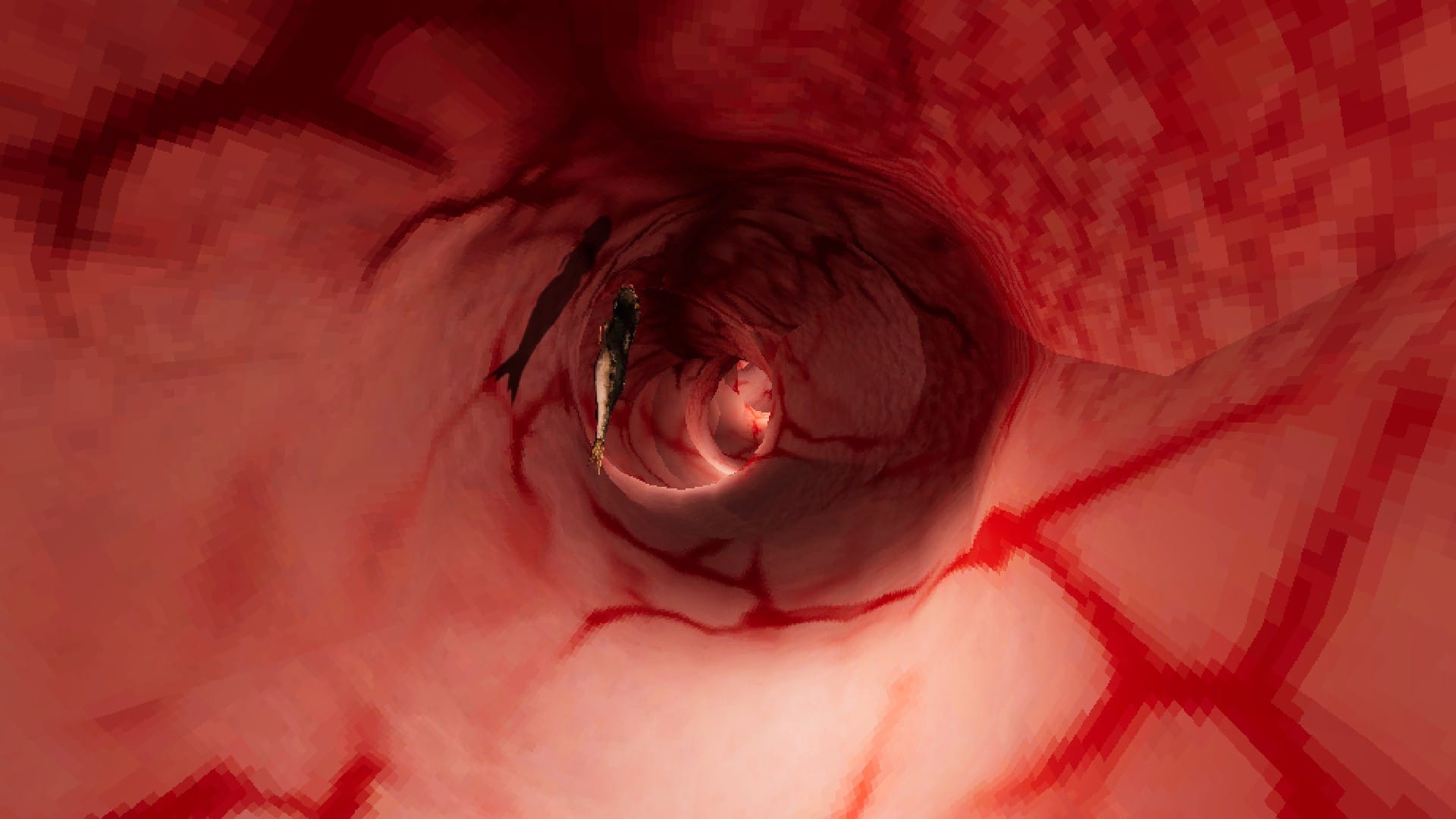
Alexander B. Joy
How Fish Is Made amounts to a walking simulator, one with a brilliantly bad game feel. Case in point: I hate how your character moves. There’s something viscerally unpleasant about watching a fish writhe and flop on its side to maneuver, undulating like a perpendicular snake. Fish don’t operate that way (unless beached and under duress), making it uncanny and distressing to behold. Yet this discomfort serves a purpose. The biomechanics of movement are often invisible in walking simulators, such that Bitsy – the walking simulator engine par excellence – forgoes walking animations entirely. How Fish Is Made, by contrast, makes the mechanisms of your locomotion impossible to ignore. In this way, the game turns an otherwise pedestrian (sorry) genre into an experience that feels nothing like its bones. You notice that you’re squirming. You sense every bit of the slimy, oily, awkward business of being alive.
All this discomfort is marshaled in service of a nihilist narrative suffused with black humor. Your quest – such as it is – involves determining whether to travel UP or DOWN. Nothing else is explained, but it’s clear that no explanation would carry any weight. The game takes pains to remind you that nothing matters, and any meanings ascribed to anything appear ridiculous from the right (or wrong) vantage.
How Fish Is Made milks this for some top-tier dark comedy, such as when you stumble across an “anointed” fish lying asphyxiated inside a used condom. Also, the line “We can only POETRY them!” is certain to rattle around in my brain forevermore. Your actions are thus at once frivolous and weighty. Will you crush others within the mechanisms of machinery you barely understand to reach goals that are no clearer to you? Will you stay your course, or change your mind? Who cares? Certainly not this game.
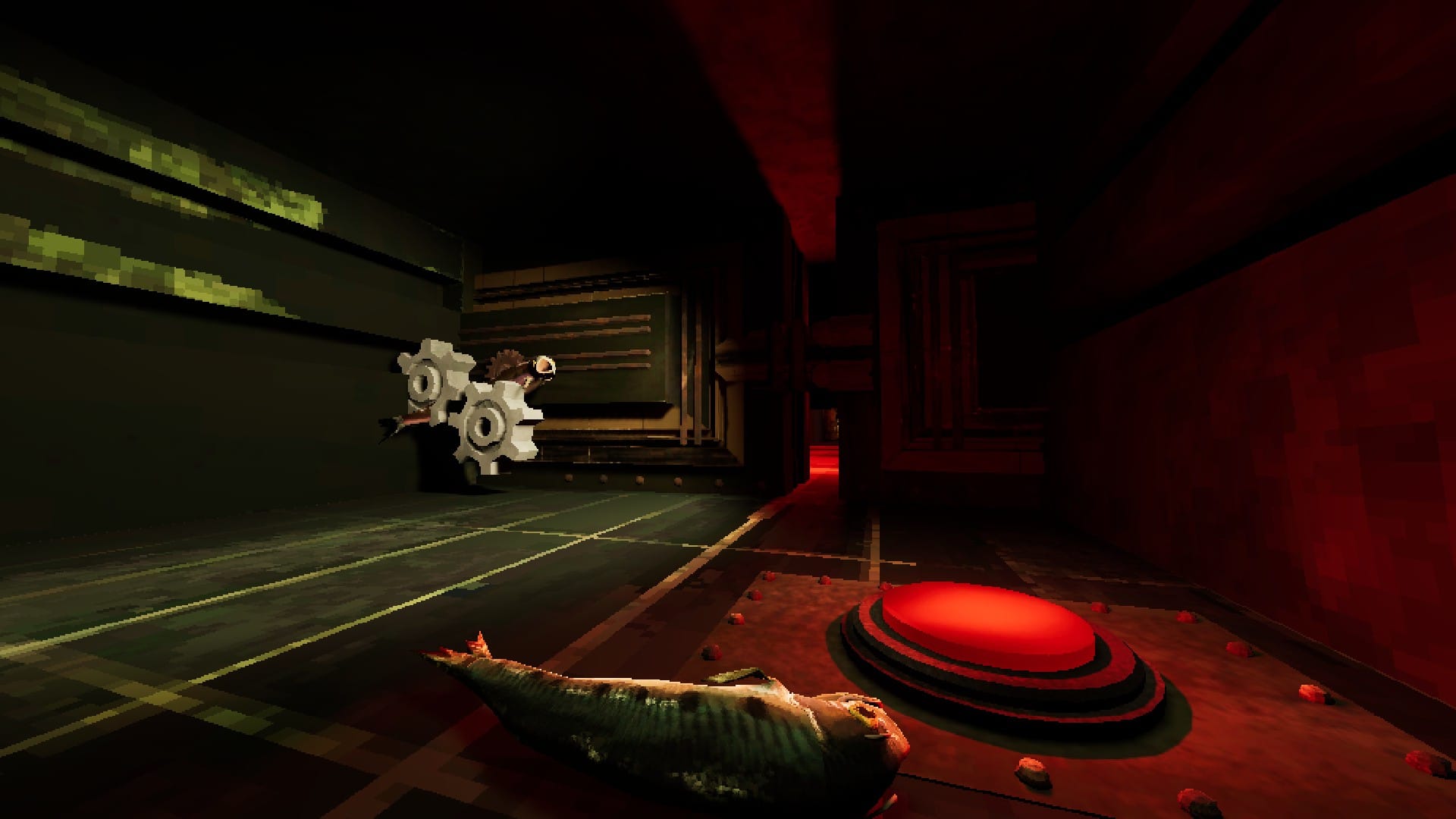
The issue with stories about nihilism is that they’re all fundamentally the same. Nothing matters, choices are meaningless and illusory, all is vanity, etc. It’s interesting to plumb the first time around, like when you discover Beckett in your late teens or early twenties. But there are only so many ways this story can be told, with few new insights to wring from such a worn concept. To the game’s credit, though, if it doesn’t lead you to think anything new, it definitely makes you feel – squishy and greasy and grossly embodied in a way nihilist narratives often overlook in favor of disconnected abstraction. How Fish Is Made is less about philosophically reckoning with the universe’s apathy than exploring the material reality of wallowing in it. Don’t like it? Good. Here’s to holding grudges.
Wallace Truesdale
When I first played How Fish is Made in July 2024, most of my attention was focused on the unnerving excursion’s conversations around decision-making. Despite every fish’s preoccupation with going up or down, the interesting part of this game is how each fish validates their choice. You watch each fish explaining, at varying levels of sanity, why they’re right, why someone else is wrong, and why your choice ultimately means nothing. Going up or down indeed has no significant consequence when you roll credits. That doesn’t mean I walked away without a heightened awareness of how I was making decisions and what I was telling myself afterward. However, on this second playthrough, a different question bothered me more: why fish?
From visual novels to janky open worlds, the act of making decisions is not new to games, nor is the discussion of their consequences. Not even talking about how those decisions are made is exceedingly rare, but I don’t do it as a fish too often! When I sat with this thought, I left with a deeper appreciation for the game than after my first playthrough. The ugliness of your fish’s movement, best described as floundering around, looks uncannily like how I feel when making choices at times. The grandness that each fish gives an ultimately false choice can reflect the outsized attention we give to small decisions or choices whose entire purpose is to distract from predetermined outcomes. The ease with which some of the other fish got trapped in gears and plastic wrapping reminded me of how even the path to a decision can have consequences. It shouldn’t be lost that each fish is making their choice out of water, that this is fundamentally an odd place to see a creature with gills and no legs, and that decision-making is often quite like trying to chart unexplored territory.
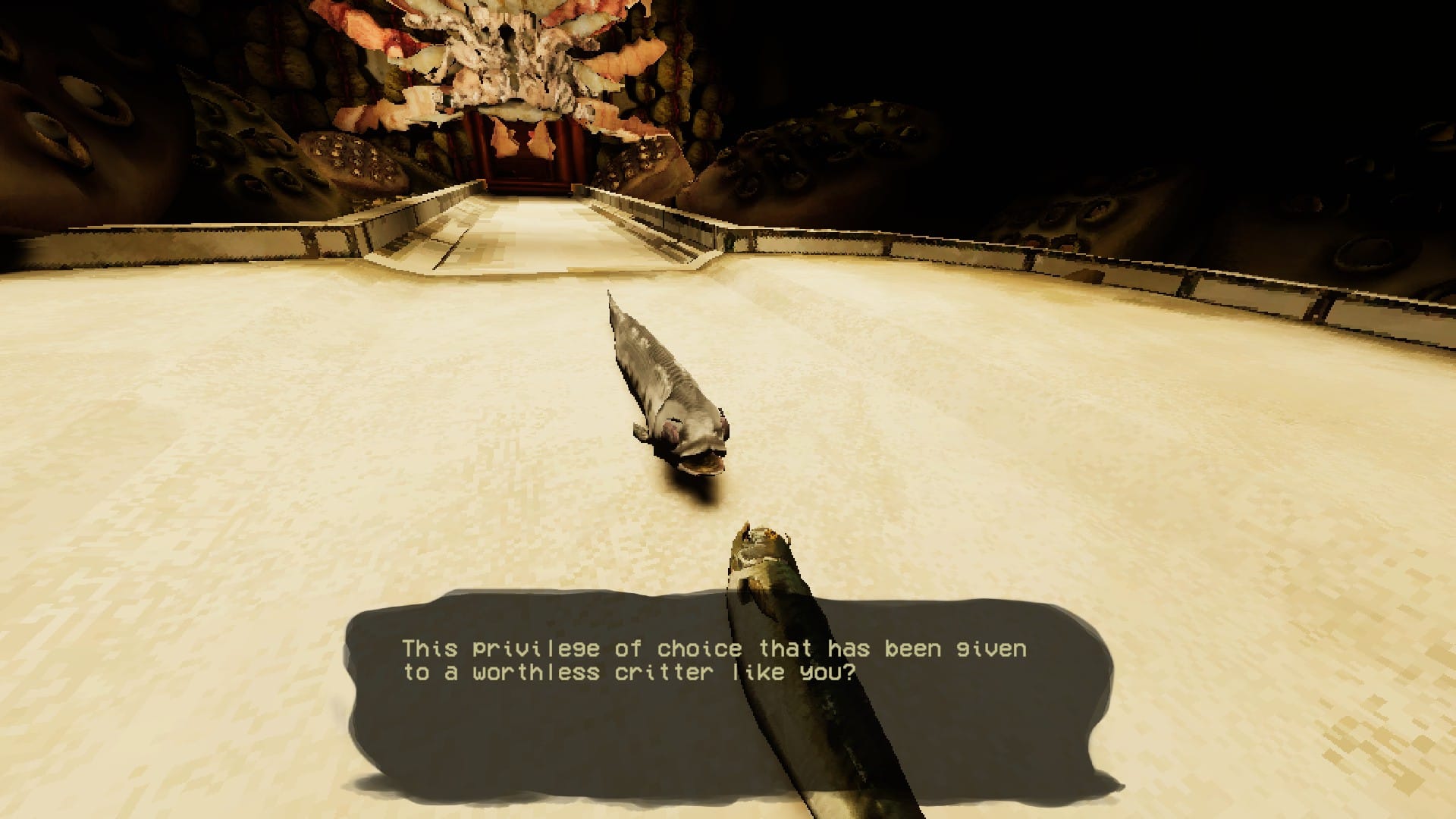
To broaden the scope a bit, fish also make me think about my senses more acutely than other creatures. Holding, smelling, and even seeing a fish can be visceral. They are slimy and often hard to hold. They smell and taste almost exclusively like themselves, no matter how you dress them up. Their mechanical make-up is so different from humans that logically explaining what it must feel like to be a fish feels doomed, outside of maybe the dependence on water. A person can look at a fish, see its lack of limbs and ability to stay underwater, and immediately understand they are nothing like this creature. But that same person can still walk away and tell you all the things they felt about a fish. Oddly, fish are great tools for practicing how to discuss feelings.
While How Fish Is Made isn’t treading new ground, its method of traversing it is unique and makes it worth recommending. By adding you to the school of fish who are in for a harsh lesson, surrounded by machinery and guts meant to make you queasy, it creates an experience that gets you to feel the good, bad, and really ugly of the decision-making process.
